Category Archives: Letters
Eric’s Letter
Feast of the Visitation of Mary, 31 May 2019
A LETTER FROM THE GENERAL RESPONSIBLE TO THE BROTHERS OF THE WORLD
“The Advocate, the Holy Spirit whom the Father will send in my name will teach you everything and remind you of all that I told you.” (John 14:26)
Warm greetings of peace to you, dear brothers,
 With all humility, I make a personal confession why it took me so long to write this letter. Many times, I sat in front of my computer not knowing what and how to write. It felt like a pregnant woman about to give birth but her pelvis is too narrow for the new born. I struggled with words but my biggest struggle was the heart, having the right spirit and disposition of a brother. Many of you are mere names to me without faces and stories that we share to qualify our being brothers. I needed the time to ground myself to the Father who has invited me to leave the comfort of my homeland and is sending me as a missionary brother. I needed moments of nakedness before Jesus at prayer whose Spirit at Nazareth is inviting you and me to this great adventure of downward mobility, living simply but with joy, in ordinariness and obscurity, finding the last place, consumed by the gospel of the greatest as the least, seeing Jesus in the poor, apostolate of goodness, not lording over but serving, to be poor
With all humility, I make a personal confession why it took me so long to write this letter. Many times, I sat in front of my computer not knowing what and how to write. It felt like a pregnant woman about to give birth but her pelvis is too narrow for the new born. I struggled with words but my biggest struggle was the heart, having the right spirit and disposition of a brother. Many of you are mere names to me without faces and stories that we share to qualify our being brothers. I needed the time to ground myself to the Father who has invited me to leave the comfort of my homeland and is sending me as a missionary brother. I needed moments of nakedness before Jesus at prayer whose Spirit at Nazareth is inviting you and me to this great adventure of downward mobility, living simply but with joy, in ordinariness and obscurity, finding the last place, consumed by the gospel of the greatest as the least, seeing Jesus in the poor, apostolate of goodness, not lording over but serving, to be poor 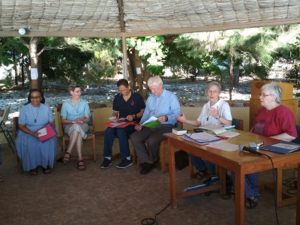 in spirit for the sake of the kingdom. I needed the space of being rekindled by the spirituality, life and intuitions of Brother Charles through the testimonies of brothers and sisters who are deep into the life and the tradition of the Fraternity. The meeting with the spiritual family at Haiti last April, my visits to the brothers in Haiti, Dominican Republic and the United States and my retreat at a Trappist Monastery in Georgia have been a tremendous help. (These will be the subject of my next letter). Jesus too needed that space in my heart for my conversion because even if I am 30 years in the fraternity and have been in 3 months of Nazareth, I still have unhealthy and immature ways that may stand in the way of this ministry. Being an unfinished project myself, I need your honest feedback and fraternal advice. Please tell me and I would gladly receive them as a gift for my on-going formation.
in spirit for the sake of the kingdom. I needed the space of being rekindled by the spirituality, life and intuitions of Brother Charles through the testimonies of brothers and sisters who are deep into the life and the tradition of the Fraternity. The meeting with the spiritual family at Haiti last April, my visits to the brothers in Haiti, Dominican Republic and the United States and my retreat at a Trappist Monastery in Georgia have been a tremendous help. (These will be the subject of my next letter). Jesus too needed that space in my heart for my conversion because even if I am 30 years in the fraternity and have been in 3 months of Nazareth, I still have unhealthy and immature ways that may stand in the way of this ministry. Being an unfinished project myself, I need your honest feedback and fraternal advice. Please tell me and I would gladly receive them as a gift for my on-going formation.
As you know, before I was elected general responsible, my world revolved around my little fraternity in a small village, without TV and internet, as a chaplain of a small Carmelite monastery of nuns and dean of studies of a small college seminary, coming from a small diocese in the Philippines. My world was then very small, my way of living very rural and the thought of writing to the brothers all over the world is overwhelming at the least. I thank the Advocate for enabling me to write. I pray that these same words may not stand in His way of teaching us everything that Jesus wants us to know. I thank you for your generous patience. I am so sorry for those who feel orphaned by my long silence. In my silence, I whispered your names in my prayer (thanks to the directory), one day at a time.
Another Look at Cebu Assembly and Beyond
Our Cebu Assembly last January was indeed “a precious manifestation of the Spirit of Pentecost.” My brotherly joy and sincere gratitude to all of you who have prayed for us while in Assembly. To our continental and country responsibles with our former general responsibles, Mariano and Abraham who have travelled to the other side of the globe just to be in the assembly, thank you very much. To the previous team – Aurelio, Jean Francois, Emmanuel, Mark and Mauricio – for your great planning and hard work before and during the assembly, thank you very much. We can only build on what you have generously laboured. Thanks in particular to Aurelio for the legacy project of iesuscaritas.org website and for Jose Alberto Hernandis who is very willing to manage our website. My joy and gratitude to the members of my team with Tony Llanes as my co-general responsible who are very willing to serve. Since ours is service to the international fraternity, may I beg you to write to us your concerns, news, invitations, feedbacks, stories. I personally chose them to represent the four continents so that there would be more easy access to news and information. Here are our contact details:
Eric Lozada, ericlozada@yahoo.com – 63 9167939585;
Tony Llanes, stonyllanes@yahoo.com – 63 9183908488;
Fernando Tapia, ftapia@iglesia.cl – 56 988880397
Honore Savadogo, sawono2002@yahoo.com – 226 70717642
Matthias Keil, Matthias.keil@graz-seckau.at – 43 67687426115.
Just as you trust us, can we also trust you to help us in this? More than a top-down dynamic, we wish to have more dialogue, transparency, reciprocity, feedbacking in our different levels of communication. For a start, we are meeting this 11-18 of October in 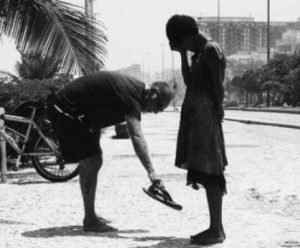 South Korea and we would appreciate anything from you – personal, local, national, regional – that you may want us to consider and respond to. You may channel them to me or to your continental representative in the team.
South Korea and we would appreciate anything from you – personal, local, national, regional – that you may want us to consider and respond to. You may channel them to me or to your continental representative in the team.
Brothers, the Letter from Cebu is not a finished document. It is a work-in-progress. May I invite you (and let us be together in this) to make it a subject for personal and fraternity re-reading and discussion. In Cebu, we have identified and have committed ourselves to be missionary diocesan priests inspired by the witness of Bro Charles. We have contemplated the realities of our society, church and fraternities from the different continents and countries. We have listened to the call of the Spirit to be church in the peripheries (thanks to the prophetic leadership of Pope Francis). And from the calls that we heard, we are firmly resolved to concrete and strategic actions for the development of our society, church and fraternities.
In your re-reading and discussion, may I invite you to treat the document as a friend whose words are Spirit-filled, transformative and prophetic. The reality of violence, terrorism, injustice, trafficking, serious ecological crisis, migration, globalization of indifference, fundamentalism, secularization (the list is too long) is very complex. Yet almost immediately, we tend to project this reality from outside. This attitude is not very helpful. We need to be more involved. Asking the Spirit for the gift of courage and humility, we take a long, loving look at our interior structures/subcultures –values, mentality, lifestyle, biases, attitude, preferences, wants – as diocesan priests. We name the many subtle ways where we have been part of the problem. We share our realizations to brothers in our fraternity who could help us in our growth. Perhaps, the most beautiful gift we could offer our world today is by owning that we have been a part of the problem. Hopefully, with repentant and transformed hearts, we become part of the solution.
The Spirit is calling us to be a church in the peripheries. Asking the Spirit for the gift of courage and trust, we explore together the peripheries of our soul – the rejected, ugly, despised, deep-seated, hidden, denied parts of ourselves that we need to claim, own, accept, embrace and heal. Here, we need the intimacy of our fraternity to be able to share our deepest wounds without being judged. As need be, we may consult a professional for our on-going growth and recovery. Then, the next time we go to the peripheries, we are 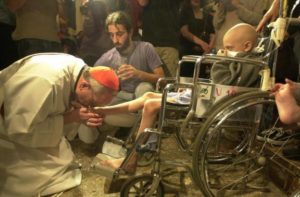 different. We are more interiorly free and happy missionaries. The sad thing is when we go with our unhealed wounds and unreal selves. We go blind, needy, full of ourselves and we do not even know that. We forget the agenda of Jesus and the Kingdom. How can the blind lead another blind? I am convinced that the best gift of mission we can give to the people of God, especially to the poor is our attentiveness to our on-going transformation as missionary disciples of Jesus.
different. We are more interiorly free and happy missionaries. The sad thing is when we go with our unhealed wounds and unreal selves. We go blind, needy, full of ourselves and we do not even know that. We forget the agenda of Jesus and the Kingdom. How can the blind lead another blind? I am convinced that the best gift of mission we can give to the people of God, especially to the poor is our attentiveness to our on-going transformation as missionary disciples of Jesus.
Brothers, in Cebu, we saw how we all struggled with the desert day and review of life. We need to treat this fact not as a conclusion but as a starting point. The conclusion is quite obvious and we need to be honest about it. It means poor quality of our meetings, our relationships, our ministries and even our prayer. This is our poverty and our lack of attentiveness to the essentials. This is also our path to liberation and wholeness if we want 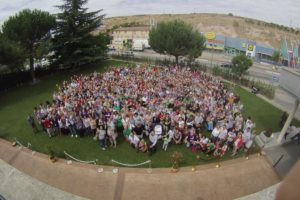 it. We need a firm resolve to commit to a regular and quality time of solitude in the desert where the Divine Therapist could transform us and make us whole. Our review of life is not a mere report of our lives and ministries, no matter how honest we are. Rather, it is a place of encounter with the Spirit who enables us to see our lives as God sees us. Our fraternal sharing is a real place of heart-to-heart meeting. In the regularity of such meeting, we grow together as soul brothers – more trusting, honest, intimate, truthful, less judgmental, pretentious and defensive, more caring and committed to each other’s on-going growth as beloved disciples of Jesus at Nazareth inspired by Bro Charles. This witness of fraternity is for me a good vocation campaign.
it. We need a firm resolve to commit to a regular and quality time of solitude in the desert where the Divine Therapist could transform us and make us whole. Our review of life is not a mere report of our lives and ministries, no matter how honest we are. Rather, it is a place of encounter with the Spirit who enables us to see our lives as God sees us. Our fraternal sharing is a real place of heart-to-heart meeting. In the regularity of such meeting, we grow together as soul brothers – more trusting, honest, intimate, truthful, less judgmental, pretentious and defensive, more caring and committed to each other’s on-going growth as beloved disciples of Jesus at Nazareth inspired by Bro Charles. This witness of fraternity is for me a good vocation campaign.
Come, O Holy Spirit, Come
Allow me to speak a little about the coming Pentecost feast. The Acts of the Apostles records, “When the time for Pentecost was fulfilled, they were all in one place together. And suddenly there came from the sky a noise like a strong driving wind, and it filled the entire house in which they were. Then there appeared to them tongues as of fire, which parted and came to rest on each of them. And they were all filled with the Holy Spirit and began to speak in different tongues, as the spirit enabled them to proclaim.“ (Acts 2:1-4)
 With due respect to our bible experts, especially Emmanuel Asi, may I invite you to meditate with me this text. It seems that the favourite place of the Holy Spirit is when persons meet as an intentional community of friends, brothers, ((including sisters) believers of the Risen Christ. At its core, a community, different from a crowd, is a firm resolve of every member to ceaselessly work for what unites rather than what divides, mindful that everything is a gift and that there is only One Giver. Though we struggle with differences (mind you, it is always a tough one) but we keep coming and falling into the Source that unite us. Every time we pray, “Come O Holy Spirit and renew the face of the earth,” we are praying what Jesus the High Priest dream of the world, “Father, that all may be one just as you and I are one.“(Jn. 17:21) The Holy Spirit, the Giver of Life (as we profess in the creed) infinitely animates, enables, transforms and gathers all of creation so that it becomes one living image of unity in the Trinity just like in the beginning. The whole earth, not just the human world, as Pope Francis fondly calls, becomes our common home where life in all its forms is revered as sacred and a gift. When Paul teaches the community at Philippi “to put all things under Christ,”(2:10) Christ is the universal reference point of everything and not just for Christians. To be men and women of the Spirit, then is to always work for what includes rather than what excludes, for dialogue, for universal fraternity with everything that is.
With due respect to our bible experts, especially Emmanuel Asi, may I invite you to meditate with me this text. It seems that the favourite place of the Holy Spirit is when persons meet as an intentional community of friends, brothers, ((including sisters) believers of the Risen Christ. At its core, a community, different from a crowd, is a firm resolve of every member to ceaselessly work for what unites rather than what divides, mindful that everything is a gift and that there is only One Giver. Though we struggle with differences (mind you, it is always a tough one) but we keep coming and falling into the Source that unite us. Every time we pray, “Come O Holy Spirit and renew the face of the earth,” we are praying what Jesus the High Priest dream of the world, “Father, that all may be one just as you and I are one.“(Jn. 17:21) The Holy Spirit, the Giver of Life (as we profess in the creed) infinitely animates, enables, transforms and gathers all of creation so that it becomes one living image of unity in the Trinity just like in the beginning. The whole earth, not just the human world, as Pope Francis fondly calls, becomes our common home where life in all its forms is revered as sacred and a gift. When Paul teaches the community at Philippi “to put all things under Christ,”(2:10) Christ is the universal reference point of everything and not just for Christians. To be men and women of the Spirit, then is to always work for what includes rather than what excludes, for dialogue, for universal fraternity with everything that is.
 Jesus’ name for the Spirit is the Advocate. Jesus promised the Advocate who will teach us everything that we need to know. In legal terms, the advocate means a defence attorney. The Spirit is our defence against the spirit of the Evil One operating in our world today, be it in political and economic structures, in interpersonal, familial or communal relationships even in the subcultures within church and religion. It is very cunning and deceptive, always disguised as good and even as license to do evil in the name of God. The text tells us that the coming of the Invisible Spirit takes the visible form of tongues of fire resting on the head of each of the apostles gathered. We pray for that fire to rest on each of us “to transform our hearts of stone into hearts of flesh” and make us more able to discern very well where evil lies from good. May the fire of Truth rekindle our hearts with a passion for Jesus and the Kingdom. The other visible image of the Holy Spirit is a strong wind that fills the entire place of those gathered. We pray for that strong wind to topple down and transform hearts and institutions hardened by indifference, violence, hatred, resentment, exclusion that only fragments God’s creation. May the Spirit who is a strong Wind widen the spaces of every human heart to include the poor, the marginalized and the stranger in the family of God’s beloved children. May our fraternities be schools of the Spirit so that we become passionate yet gentle disciples of Jesus at Nazareth in our violent and fragmented world as inspired by Brother Charles.
Jesus’ name for the Spirit is the Advocate. Jesus promised the Advocate who will teach us everything that we need to know. In legal terms, the advocate means a defence attorney. The Spirit is our defence against the spirit of the Evil One operating in our world today, be it in political and economic structures, in interpersonal, familial or communal relationships even in the subcultures within church and religion. It is very cunning and deceptive, always disguised as good and even as license to do evil in the name of God. The text tells us that the coming of the Invisible Spirit takes the visible form of tongues of fire resting on the head of each of the apostles gathered. We pray for that fire to rest on each of us “to transform our hearts of stone into hearts of flesh” and make us more able to discern very well where evil lies from good. May the fire of Truth rekindle our hearts with a passion for Jesus and the Kingdom. The other visible image of the Holy Spirit is a strong wind that fills the entire place of those gathered. We pray for that strong wind to topple down and transform hearts and institutions hardened by indifference, violence, hatred, resentment, exclusion that only fragments God’s creation. May the Spirit who is a strong Wind widen the spaces of every human heart to include the poor, the marginalized and the stranger in the family of God’s beloved children. May our fraternities be schools of the Spirit so that we become passionate yet gentle disciples of Jesus at Nazareth in our violent and fragmented world as inspired by Brother Charles.
Brother Charles, the Universal Brother
Finally, a note on Brother Charles. Early this year, Little Sister Kathleen of Jesus published a book of the same title. It contains the major themes and I love how it is written. Thank you very much, Kathleen. As you already know, Brother Charles – his life, message, intuitions – should occupy a significant space in our on-going formation as diocesan priests. It is what qualifies us. The more we know him, the more we know Jesus, his Beloved. Brother Charles is not just some icon to be venerated. He is a living call, a tangible point person in our deep longing to follow Jesus.
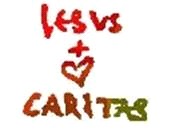 On the call to be universal brother, Little Brother Antoine Chatelard points out, “It’s first about being a brother, before thinking about being universal.” In the life of Brother Charles, the intuition to be a universal brother first happened in October of 1901, as Sr. Kathleen narrates, when Brother Charles settled at Beni Abbes. Through the generosity of his cousin Marie, he was able to buy a piece of land strategically located halfway between the walled local villages and the French garrison. He built, through the help of the French army, a little monastery bounded by lines of big stones. And this is the key. “He himself would rarely go beyond it but anyone could enter. He wished to be a universal brother in a context of conflict involving many opposing parties. “(p.16).
On the call to be universal brother, Little Brother Antoine Chatelard points out, “It’s first about being a brother, before thinking about being universal.” In the life of Brother Charles, the intuition to be a universal brother first happened in October of 1901, as Sr. Kathleen narrates, when Brother Charles settled at Beni Abbes. Through the generosity of his cousin Marie, he was able to buy a piece of land strategically located halfway between the walled local villages and the French garrison. He built, through the help of the French army, a little monastery bounded by lines of big stones. And this is the key. “He himself would rarely go beyond it but anyone could enter. He wished to be a universal brother in a context of conflict involving many opposing parties. “(p.16).
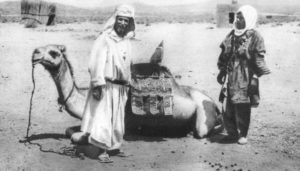 That was a moment of insight! The call to be universal brother is first and foremost the call to be a brother. In Brother Charles, to be brother is to stand in the in-between, (not black or white but gray) in the middle (not the same with being at the center) of many opposing parties. A brother is immersed, rooted, right in the midst of Reality with all its paradoxes, tensions and complex cross-points and he never leaves his stance. If he leaves and moves off the middle, he becomes particular. In embracing one, he excludes the other. He is not some fence-sitter who does not have any concrete stand on any socio-political-economic-cultural or even church issues. On the contrary, he
That was a moment of insight! The call to be universal brother is first and foremost the call to be a brother. In Brother Charles, to be brother is to stand in the in-between, (not black or white but gray) in the middle (not the same with being at the center) of many opposing parties. A brother is immersed, rooted, right in the midst of Reality with all its paradoxes, tensions and complex cross-points and he never leaves his stance. If he leaves and moves off the middle, he becomes particular. In embracing one, he excludes the other. He is not some fence-sitter who does not have any concrete stand on any socio-political-economic-cultural or even church issues. On the contrary, he 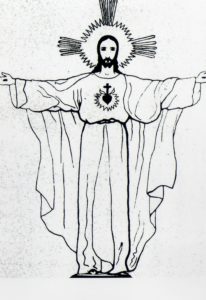 is grounded on what is going on and he stands in the middle of everything. When he opts for the poor and the marginalized, he includes the rich. Precisely, it is only in being at the middle of things that he can embrace all things as universal brother. And it is only then, with this evolving insight that Brother Charles began to call his house not a hermitage (living under a cloistered monastic rule of life) but a fraternity where anybody could come and is welcome. He painted at the ceiling of his fraternity the image of the Sacred Heart of Jesus whose arms are wide open to anyone who comes. His consuming closeness with the Sacred Heart of Jesus leads him to imitate Jesus Caritas, the Universal Brother par excellance of which he is only a humble witness pointing to Jesus.
is grounded on what is going on and he stands in the middle of everything. When he opts for the poor and the marginalized, he includes the rich. Precisely, it is only in being at the middle of things that he can embrace all things as universal brother. And it is only then, with this evolving insight that Brother Charles began to call his house not a hermitage (living under a cloistered monastic rule of life) but a fraternity where anybody could come and is welcome. He painted at the ceiling of his fraternity the image of the Sacred Heart of Jesus whose arms are wide open to anyone who comes. His consuming closeness with the Sacred Heart of Jesus leads him to imitate Jesus Caritas, the Universal Brother par excellance of which he is only a humble witness pointing to Jesus.
Brothers, thank you very much for your generous patience in reading along my rather long letter. I continue to hold you, your fraternities and your dioceses in my prayer one country at a time. Please pray for me also your little servant-brother.
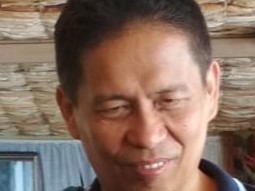 With my fraternal embrace in Jesus Caritas,
With my fraternal embrace in Jesus Caritas,
Eric Lozada
MESSAGE OF HIS HOLINESS POPE FRANCIS: Good politics is at the service of peace
FOR THE CELEBRATION OF THE
52nd WORLD DAY OF PEACE
1 JANUARY 2019
1. “Peace be to this house!”
In sending his disciples forth on mission, Jesus told them: “Whatever house you enter, first say, ‘Peace be to this house!’ And if a son of peace is there, your peace shall rest upon him; but if not, it shall return to you” (Lk 10:5-6).
Bringing peace is central to the mission of Christ’s disciples. That peace is offered to all those men and women who long for peace amid the tragedies and violence that mark human history.[1]The “house” of which Jesus speaks is every family, community, country and continent, in all their diversity and history. It is first and foremost each individual person, without distinction or discrimination. But it is also our “common home”: the world in which God has placed us and which we are called to care for and cultivate.
So let this be my greeting at the beginning of the New Year: “Peace be to this house!”
2. The challenge of good politics
Peace is like the hope which the poet Charles Péguy celebrated.[2] It is like a delicate flower struggling to blossom on the stony ground of violence. We know that the thirst for power at any price leads to abuses and injustice. Politics is an essential means of building human community and institutions, but when political life is not seen as a form of service to society as a whole, it can become a means of oppression, marginalization and even destruction.
Jesus tells us that, “if anyone would be first, he must be last of all and servant of all” (Mk 9:35). In the words of Pope Paul VI, “to take politics seriously at its different levels – local, regional, national and worldwide – is to affirm the duty of each individual to acknowledge the reality and value of the freedom offered him to work at one and the same time for the good of the city, the nation and all mankind”.[3]
Political office and political responsibility thus constantly challenge those called to the service of their country to make every effort to protect those who live there and to create the conditions for a worthy and just future. If exercised with basic respect for the life, freedom and dignity of persons, political life can indeed become an outstanding form of charity.
3. Charity and human virtues: the basis of politics at the service of human rights and peace
Pope Benedict XVI noted that “every Christian is called to practise charity in a manner corresponding to his vocation and according to the degree of influence he wields in the pólis… When animated by charity, commitment to the common good has greater worth than a merely secular and political stand would have… Man’s earthly activity, when inspired and sustained by charity, contributes to the building of the universal city of God, which is the goal of the history of the human family”.[4] This is a programme on which all politicians, whatever their culture or religion, can agree, if they wish to work together for the good of the human family and to practise those human virtues that sustain all sound political activity: justice, equality, mutual respect, sincerity, honesty, fidelity.
In this regard, it may be helpful to recall the “Beatitudes of the Politician”, proposed by Vietnamese Cardinal François-Xavier Nguyễn Vãn Thuận, a faithful witness to the Gospel who died in 2002:
Blessed be the politician with a lofty sense and deep understanding of his role.
Blessed be the politician who personally exemplifies credibility.
Blessed be the politician who works for the common good and not his or her own interest.
Blessed be the politician who remains consistent.
Blessed be the politician who works for unity.
Blessed be the politician who works to accomplish radical change.
Blessed be the politician who is capable of listening.
Blessed be the politician who is without fear.[5]
Every election and re-election, and every stage of public life, is an opportunity to return to the original points of reference that inspire justice and law. One thing is certain: good politics is at the service of peace. It respects and promotes fundamental human rights, which are at the same time mutual obligations, enabling a bond of trust and gratitude to be forged between present and future generations.
4. Political vices
Sadly, together with its virtues, politics also has its share of vices, whether due to personal incompetence or to flaws in the system and its institutions. Clearly, these vices detract from the credibility of political life overall, as well as the authority, decisions and actions of those engaged in it. These vices, which undermine the ideal of an authentic democracy, bring disgrace to public life and threaten social harmony. We think of corruption in its varied forms: the misappropriation of public resources, the exploitation of individuals, the denial of rights, the flouting of community rules, dishonest gain, the justification of power by force or the arbitrary appeal to raison d’état and the refusal to relinquish power. To which we can add xenophobia, racism, lack of concern for the natural environment, the plundering of natural resources for the sake of quick profit and contempt for those forced into exile.
5. Good politics promotes the participation of the young and trust in others
When the exercise of political power aims only at protecting the interests of a few privileged individuals, the future is compromised and young people can be tempted to lose confidence, since they are relegated to the margins of society without the possibility of helping to build the future. But when politics concretely fosters the talents of young people and their aspirations, peace grows in their outlook and on their faces. It becomes a confident assurance that says, “I trust you and with you I believe” that we can all work together for the common good. Politics is at the service of peace if it finds expression in the recognition of the gifts and abilities of each individual. “What could be more beautiful than an outstretched hand? It was meant by God to offer and to receive. God did not want it to kill (cf. Gen 4:1ff) or to inflict suffering, but to offer care and help in life. Together with our heart and our intelligence, our hands too can become a means of dialogue”.[6]
Everyone can contribute his or her stone to help build the common home. Authentic political life, grounded in law and in frank and fair relations between individuals, experiences renewal whenever we are convinced that every woman, man and generation brings the promise of new relational, intellectual, cultural and spiritual energies. That kind of trust is never easy to achieve, because human relations are complex, especially in our own times, marked by a climate of mistrust rooted in the fear of others or of strangers, or anxiety about one’s personal security. Sadly, it is also seen at the political level, in attitudes of rejection or forms of nationalism that call into question the fraternity of which our globalized world has such great need. Today more than ever, our societies need “artisans of peace” who can be messengers and authentic witnesses of God the Father, who wills the good and the happiness of the human family.
6. No to war and to the strategy of fear
A hundred years after the end of the First World War, as we remember the young people killed in those battles and the civilian populations torn apart, we are more conscious than ever of the terrible lesson taught by fratricidal wars: peace can never be reduced solely to a balance between power and fear. To threaten others is to lower them to the status of objects and to deny their dignity. This is why we state once more that an escalation of intimidation, and the uncontrolled proliferation of arms, is contrary to morality and the search for true peace. Terror exerted over those who are most vulnerable contributes to the exile of entire populations who seek a place of peace. Political addresses that tend to blame every evil on migrants and to deprive the poor of hope are unacceptable. Rather, there is a need to reaffirm that peace is based on respect for each person, whatever his or her background, on respect for the law and the common good, on respect for the environment entrusted to our care and for the richness of the moral tradition inherited from past generations.
Our thoughts turn in a particular way to all those children currently living in areas of conflict, and to all those who work to protect their lives and defend their rights. One out of every six children in our world is affected by the violence of war or its effects, even when they are not enrolled as child soldiers or held hostage by armed groups. The witness given by those who work to defend them and their dignity is most precious for the future of humanity.
7. A great project of peace
In these days, we celebrate the seventieth anniversary of the Universal Declaration of Human Rights, adopted in the wake of the Second World War. In this context, let us also remember the observation of Pope John XXIII: “Man’s awareness of his rights must inevitably lead him to the recognition of his duties. The possession of rights involves the duty of implementing those rights, for they are the expression of a man’s personal dignity. And the possession of rights also involves their recognition and respect by others”.[7]
Peace, in effect, is the fruit of a great political project grounded in the mutual responsibility and interdependence of human beings. But it is also a challenge that demands to be taken up ever anew. It entails a conversion of heart and soul; it is both interior and communal; and it has three inseparable aspects:
– peace with oneself, rejecting inflexibility, anger and impatience; in the words of Saint Francis de Sales, showing “a bit of sweetness towards oneself” in order to offer “a bit of sweetness to others”;
– peace with others: family members, friends, strangers, the poor and the suffering, being unafraid to encounter them and listen to what they have to say;
– peace with all creation, rediscovering the grandeur of God’s gift and our individual and shared responsibility as inhabitants of this world, citizens and builders of the future.
The politics of peace, conscious of and deeply concerned for every situation of human vulnerability, can always draw inspiration from the Magnificat, the hymn that Mary, the Mother of Christ the Saviour and Queen of Peace, sang in the name of all mankind: “He has mercy on those who fear him in every generation. He has shown the strength of his arm; he has scattered the proud in their conceit. He has cast down the mighty from their thrones, and has lifted up the lowly; …for he has remembered his promise of mercy, the promise he made to our fathers, to Abraham and his children for ever” (Lk 1:50-55).
From the Vatican, 8 December 2018
Francis
[1] Cf. Lk 2:14: “Glory to God in the highest, and on earth peace among men with whom he is pleased”.
[2] Cf. Le Porche du mystère de la deuxième vertu, Paris, 1986.
[3] Apostolic Letter Octogesima Adveniens (14 May 1971), 46.
[4] Encyclical Letter Caritas in Veritate (29 June 2009), 7.
[5] Cf. Address at the “Civitas” Exhibition-Convention in Padua: “30 Giorni”, no. 5, 2002.
[6] BENEDICT XVI, Address to the Authorities of Benin, Cotonou, 19 November 2011.
[7] Encyclical Letter Pacem in Terris (11 April 1963), ed. Carlen, 24.
© Copyright – Libreria Editrice Vaticana
PDF:PF 1_1_2019 en
Advent Letter 2018, brother responsible
Dear brothers,
 On this feast day of our brother Charles we begin Advent: the weeks of hope that are a reflection of the hope of all humanity. Our humanity, in permanent crisis, a humanitarian crisis with many aspects, pains all of us, and we cannot hide it in our Church or remain indifferent. May celebrations with our communities, personal prayer, life in fraternity, be
On this feast day of our brother Charles we begin Advent: the weeks of hope that are a reflection of the hope of all humanity. Our humanity, in permanent crisis, a humanitarian crisis with many aspects, pains all of us, and we cannot hide it in our Church or remain indifferent. May celebrations with our communities, personal prayer, life in fraternity, be 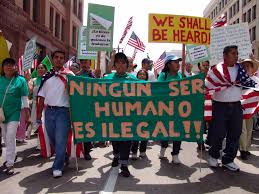 of closeness to that part of humanity with whom we live in our places and in those who are far away. Advent motivates us to listen to the voice that cries in the desert of all those who raise their voice for survival, in their desire for peace, work, and freedom. Humanity keeps hoping for liberation; the poor who hope for salvation, those threatened by war, the displaced searching for a secure place… There are millions of people in this situation. For them too Jesus is proclaimed and we, as missionaries, ought to proclaim him.
of closeness to that part of humanity with whom we live in our places and in those who are far away. Advent motivates us to listen to the voice that cries in the desert of all those who raise their voice for survival, in their desire for peace, work, and freedom. Humanity keeps hoping for liberation; the poor who hope for salvation, those threatened by war, the displaced searching for a secure place… There are millions of people in this situation. For them too Jesus is proclaimed and we, as missionaries, ought to proclaim him.
The Church is living through a difficult moment because of the crisis caused by the allegations of the abuse of minors, and Pope Francis is responding with humility and courage to the world. This is a testament to the search for the truth. Francis too is a witness to the truth.
We are preparing our World Assembly 2019. We are called to reflect on our identity as diocesan missionary priests in the charism of Charles de FOUCAULD. This is a task for all the brothers, supporting the regional responsibles, praying for all the brothers of the world, for the fraternities that are beginning and those that are ageing.
A HUMANITY IN CRISIS
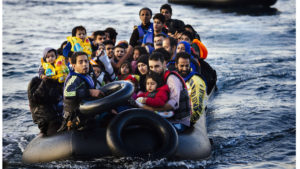 Every day we receive bad news of men and women, children, young people and the elderly, who suffer from causes that are not always clear to public opinion and the media. We know that it depends often on the hidden interests of economic powers and governments who hide very harsh realities in their countries, even if they belong to the “First World”. Victims of wars, of violence, of drug-trafficking, of the male domination over women in many cultures, the victims of poverty, cry out in this wilderness, where voices demanding justice abound. Voices that intermingle with others that seek vengeance, or those of “nothing is going on here” or “Go back to your country”. We too have a voice, the voice of Jesus, the one announced by the prophets. A voice that should emerge from our faith, our missionary vocation, in the style of Nazareth which is to be with the people of our town or city, with the most humble among them, because only the humble teach us to be humble. Brother Charles discovered Jesus in the midst of the simple people: may we learn from him.
Every day we receive bad news of men and women, children, young people and the elderly, who suffer from causes that are not always clear to public opinion and the media. We know that it depends often on the hidden interests of economic powers and governments who hide very harsh realities in their countries, even if they belong to the “First World”. Victims of wars, of violence, of drug-trafficking, of the male domination over women in many cultures, the victims of poverty, cry out in this wilderness, where voices demanding justice abound. Voices that intermingle with others that seek vengeance, or those of “nothing is going on here” or “Go back to your country”. We too have a voice, the voice of Jesus, the one announced by the prophets. A voice that should emerge from our faith, our missionary vocation, in the style of Nazareth which is to be with the people of our town or city, with the most humble among them, because only the humble teach us to be humble. Brother Charles discovered Jesus in the midst of the simple people: may we learn from him.
AN ADVENT THAT INVITES US TO BE RECEPTIVE
This Advent time is an invitation to listen, to stop the clock and, in a contemplative attitude to listen to the Word, the silence of God in adoration, and to listen to our brothers: our  brothers of the Fraternity, brother priests of our diocesan presbyterate who, sometimes, are hard for us to listen to and accept because prejudices kill dialogue and encounter; the people who come to us seeking answers to their problems, or who share in pastoral, social, work with us, or, simply, are our neighbours. Let us open the door, let us leave the best place in our house for whoever seeks, and not accustom ourselves to a dynamic of good advice and easy words. To show our poverty, our limitations for fixing “damaged machines”, wounded hearts, is to allow God to act. He is indispensable. It is he who heals. Jesus is not indifferent to anything, and this Advent he encourages us to open our hearts and to allow ourselves to be inundated by the love of God and the love of the people. Let us recover the joy of following Jesus and help many sad people to transform their failure into triumph, to love themselves a little more.
brothers of the Fraternity, brother priests of our diocesan presbyterate who, sometimes, are hard for us to listen to and accept because prejudices kill dialogue and encounter; the people who come to us seeking answers to their problems, or who share in pastoral, social, work with us, or, simply, are our neighbours. Let us open the door, let us leave the best place in our house for whoever seeks, and not accustom ourselves to a dynamic of good advice and easy words. To show our poverty, our limitations for fixing “damaged machines”, wounded hearts, is to allow God to act. He is indispensable. It is he who heals. Jesus is not indifferent to anything, and this Advent he encourages us to open our hearts and to allow ourselves to be inundated by the love of God and the love of the people. Let us recover the joy of following Jesus and help many sad people to transform their failure into triumph, to love themselves a little more.
A CHURCH THAT SUFFERS
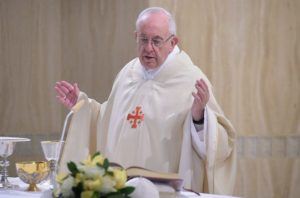 We are all suffering the consequences of child abuse hidden in many dioceses of the world. The Church is losing credibility, influence, etc. We could just say that this has always happened, that it was inevitable… We would not be faithful to the truth. We know that this open crisis has not yet ended. Pope Francis is also suffering for all of this, and is facing the music, asking forgiveness on behalf of those who did harm, listening, opening paths for a solution that offers justice for the victims, and this man deserves our support. Let us live in communion with Pope Francis, with enemies in his own Church, but with the support of all good people, whether believers or not, who see in Francis a prophet of our time, a consistent man who, despite being “head of State”, is a human being, sensitive to the suffering of humanity. I am sure that, from all this crisis, something very positive will emerge for the life of the Church and the proclamation of the Kingdom. Let us unite our prayer for fraternity with the Pope, wherever we may be.
We are all suffering the consequences of child abuse hidden in many dioceses of the world. The Church is losing credibility, influence, etc. We could just say that this has always happened, that it was inevitable… We would not be faithful to the truth. We know that this open crisis has not yet ended. Pope Francis is also suffering for all of this, and is facing the music, asking forgiveness on behalf of those who did harm, listening, opening paths for a solution that offers justice for the victims, and this man deserves our support. Let us live in communion with Pope Francis, with enemies in his own Church, but with the support of all good people, whether believers or not, who see in Francis a prophet of our time, a consistent man who, despite being “head of State”, is a human being, sensitive to the suffering of humanity. I am sure that, from all this crisis, something very positive will emerge for the life of the Church and the proclamation of the Kingdom. Let us unite our prayer for fraternity with the Pope, wherever we may be.
DECEMBER 1
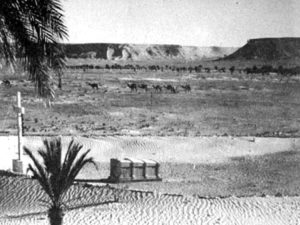 102 years ago, Charles de FOUCAULD definitively placed himself into the hands of the Father. Today is a day to give thanks to God for him, for what he transmitted to us with his intuitions, for the mission he carried out with the people who were his neighbours, for his crazy dreams. Brother Charles has helped us in our vocation and our spirituality to live in friendship with Jesus and with people, in the Nazareth that we each live, with our age and desire to live, in silence and in proclamation. It is a gift from God that deserves our continuous thanks. Let us take time to value this gift: let us place in this day’s adoration before Jesus all that has come to us from Charles de FOUCAULD which, probably, are not so much his spiritual writings as his testimony of life, of love, of abandonment, of trust and generosity.
102 years ago, Charles de FOUCAULD definitively placed himself into the hands of the Father. Today is a day to give thanks to God for him, for what he transmitted to us with his intuitions, for the mission he carried out with the people who were his neighbours, for his crazy dreams. Brother Charles has helped us in our vocation and our spirituality to live in friendship with Jesus and with people, in the Nazareth that we each live, with our age and desire to live, in silence and in proclamation. It is a gift from God that deserves our continuous thanks. Let us take time to value this gift: let us place in this day’s adoration before Jesus all that has come to us from Charles de FOUCAULD which, probably, are not so much his spiritual writings as his testimony of life, of love, of abandonment, of trust and generosity.
Let us make the prayer of abandonment even if it is hard to accept that we still have much left to make it completely ours.
OUR WORLD ASSEMBLY
From the 15th to the 30th of January 2019 we will celebrate our World Fraternity Assembly in Cebu, Philippines. The central theme is to deepen our character as diocesan missionary priests in the charism of Charles de FOUCAULD. Everything concerning the Assembly is announced on our web-page iesuscaritas.org
 On the site’s green Home Bar is the preparatory questionnaire, the Assembly program, the registration sheet… So far there are few inscriptions received and only one continent (America) has presented the answers to the questionnaire, as well as some regional fraternities. It is advisable that we do not leave these tasks to the last moment. Courage with everything. I know that we are all very busy and we have little time. Let’s make an effort. It fills me with joy to receive emails with inscriptions and answers to the questionnaire, and I understand the difficulties that this implies for some fraternities.
On the site’s green Home Bar is the preparatory questionnaire, the Assembly program, the registration sheet… So far there are few inscriptions received and only one continent (America) has presented the answers to the questionnaire, as well as some regional fraternities. It is advisable that we do not leave these tasks to the last moment. Courage with everything. I know that we are all very busy and we have little time. Let’s make an effort. It fills me with joy to receive emails with inscriptions and answers to the questionnaire, and I understand the difficulties that this implies for some fraternities.
All the regional responsibles or delegates, previous international responsibles and the continental responsibles will be coming to the Assembly. Some of our brothers cannot pay for their trips, because of the situations in their country. The world fraternity takes care of these expenses as far as possible, but nowadays it is very difficult to be able to cover all the necessities. Some fraternities of Europe and America have responded by paying the bill of a brother from Africa, or from America itself… Thank you. I am asking fraternities for your readiness to help in their journey brothers from Haiti, Burkina Faso, Central African Republic, Chad, Congo, Cameroon, Rwanda, Madagascar, Pakistan, India and Bangla Desh, who still do not have their plane ticket. It is an important effort that will make possible the presence and participation of these brothers in the Philippines.
Thanks to the Filipino Brothers for all the work in Cebu to make the assembly possible. Let us trust in the goodwill of all the brothers in the world to demonstrate that the Fraternity is more than a group of priests, a form of spirituality: It is sharing what we have. Thank you.
Our next brother responsible, who we will elect in Cebu, and his new team will help us to continue making fraternity possible out of our realities and dreams.
A STEP TOWARDS CHRISTMAS
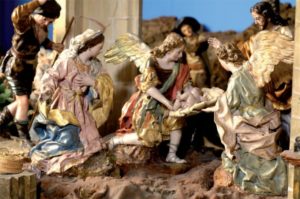 In these weeks of preparation for Christmas we will arrange the best place of our life for He who comes to stay. The Angels announced the Good News to the shepherds, and they announce many joys to us. There are angels who call to us at the door, or on the phone, or on the street, and who tell us, sometimes without knowing it, that God is with us. There are faces that make us see Jesus in the hospital, in prison, in reception centres for refugees. Angels in the persons of our sick or very old siblings, who have given everything for the Church, for the fraternity, for the poor. Faces of anonymous people who do good without expecting anything in return. The Angels of the simple people of our parishes who help us in pastoral action, or with their presence in the celebrations, or offer us the best they have of their closeness and friendship. They are angels without wings, but with a voice that no one can silence.
In these weeks of preparation for Christmas we will arrange the best place of our life for He who comes to stay. The Angels announced the Good News to the shepherds, and they announce many joys to us. There are angels who call to us at the door, or on the phone, or on the street, and who tell us, sometimes without knowing it, that God is with us. There are faces that make us see Jesus in the hospital, in prison, in reception centres for refugees. Angels in the persons of our sick or very old siblings, who have given everything for the Church, for the fraternity, for the poor. Faces of anonymous people who do good without expecting anything in return. The Angels of the simple people of our parishes who help us in pastoral action, or with their presence in the celebrations, or offer us the best they have of their closeness and friendship. They are angels without wings, but with a voice that no one can silence.
With hope this Advent for a better world, a Church free from the sorrows of the past, a fraternity of brothers working in the tasks of the Kingdom, a world renewed by efforts for peace, for human rights, against all inequalities, my desire is for a Christmas full of God, of Jesus brother and friend. A big embrace.
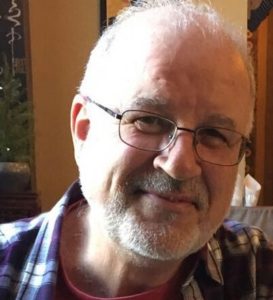 Aurelio SANZ BAEZA, brother responsible
Aurelio SANZ BAEZA, brother responsible
Perín, Cartagena, Murcia, Spain, 1 December 2018,
Feast of Blessed Charles de FOUCAULD
(Thanks so much, Liam, for translation to English)
(Français) Lettre aux amis de Québec. Jean-Pierre LANGLOIS
Asian Month of Nazareth: Letter from Baguio
Theme of the Month of Nazareth in Baguio: “Following Jesus of Nazareth in the foot steps of Charles de Foucauld”
The Filipino Fraternity played host to the 6th Asian Jesus Caritas Month of Nazareth at Mt. Peace Retreat Center, Baguio City. Priests/Brothers from 6 countries responded. While most of them arrived on time safe and sound, a few joined in between. Two members from India had a gruelling 12 hrs taxi ride from Manila to Baguio and had a tough time finding the exact location. Another Brother was so busy emailing at the airport lounge that he missed the scheduled plane and had to take another flight to Manila. But thanks be to the providence of Almighty, all those who were expected did arrive.
Read the entire document (PDF): Letter from Baguio 10 10 18
(Français) Lettre à la Famille Charles de Foucauld – 15 septembre 2018
Newsletter summer 2018. Fraternities United Estates
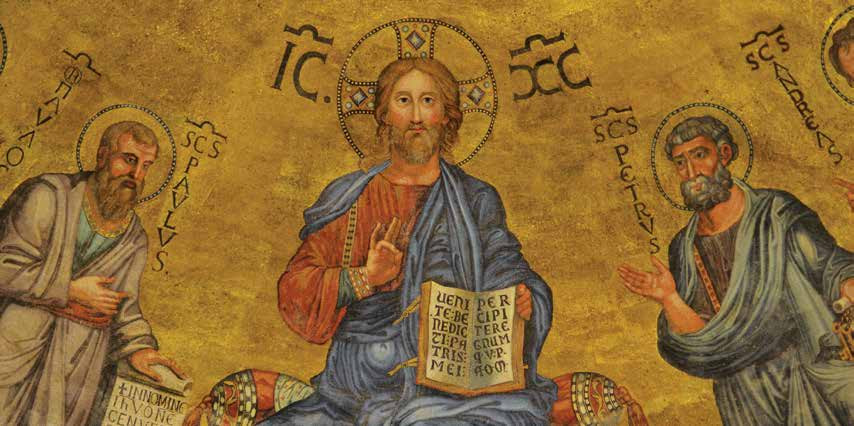 In this issue:
In this issue:
- Priests with Current Dues … 2
- Everywhere is Our Monastery – Days of Rest and Renewal in Detroit … 4
- A Change of Culture/A New Book/Universal Brother Award … 6
- National Fraternity … 7
- Upcoming Dates … 8
From the Responsible
Dear Brothers,
I write this letter to you on the Feast of St. Ignatius of Loyola. Before I knew Blessed Charles, I knew St. Ignatius. Blessed Charles helped me to see the importance of being committed to prayer with a monthly desert day and a daily holy hour, but it was St. Ignatius who gave me the spiritual resources to fill those times.
Long before it came into vogue, Ignatius taught anyone who would listen how to have a personal relationship with Jesus. His concept of conversing directly with Jesus through the use of the imagination is now a time-proven method of deepening one’s faith. His insights into the spiritual life in his Spiritual Exercises are unparalleled in helping to bring people into closer relationship with God.
As Diocesan priests we are more or less left to find our own path to a solid spiritual life. Led by God’s grace and guided by wonderful mentors like Mike Smith (for Charles) and Chuck Gallagher (for Ignatius) I found a spirituality that works; that intimately connects me to Jesus and the Father’s will for my life. I know the life of an eccentric French priest living among Moslems in the Sahara is not an easy “sell” for many Diocesan priests, but I think trying to understand how and why Blessed Charles lived out his deep love for Jesus can give spiritual strength to our priestly ministry.
Read the complete document
Letter to Gianantonio, 28 August 2018
Dear brother,
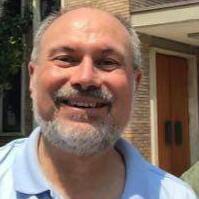 this morning you celebrated your Passover and the Lord has taken you into his arms as a most dear son. We have prayed much for you, and our prayer has not been in vain. You are in the best place among the blessed, you, who for 57 days were deprived of liberty while kidnapped in Cameroon, you, who did not lose hope in this past year of illness, you have given us every sign of peace and of confidence. “With boundless confidence…” You, who have made the Prayer of Abandonment your life, as did Charles de FOUCAULD. You, a brother loved by all those you have served, tended and worked for… I must thank you for the precious witness of your life, where you have not given up or left to others the mission the Lord entrusted to you.
this morning you celebrated your Passover and the Lord has taken you into his arms as a most dear son. We have prayed much for you, and our prayer has not been in vain. You are in the best place among the blessed, you, who for 57 days were deprived of liberty while kidnapped in Cameroon, you, who did not lose hope in this past year of illness, you have given us every sign of peace and of confidence. “With boundless confidence…” You, who have made the Prayer of Abandonment your life, as did Charles de FOUCAULD. You, a brother loved by all those you have served, tended and worked for… I must thank you for the precious witness of your life, where you have not given up or left to others the mission the Lord entrusted to you.
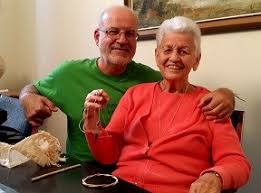 Your goodbye pains me greatly, but I know that it is temporary. We shall meet in the fraternity of the Children of God and we shall recall the chain prayer campaign around the world for your freedom while kidnapped with Gilberte, whom I had the great joy of visiting in Montreal, and she showed me the objects she had during the kidnapping, and Giampaolo, your missionary companion in Cameroon. I remember with joy the news of your being freed. The bells of many churches in Spain, Italy and so many places rang out that Easter season 2014. Your kidnapping moved us to contemplate the lack of freedom for humanity,
Your goodbye pains me greatly, but I know that it is temporary. We shall meet in the fraternity of the Children of God and we shall recall the chain prayer campaign around the world for your freedom while kidnapped with Gilberte, whom I had the great joy of visiting in Montreal, and she showed me the objects she had during the kidnapping, and Giampaolo, your missionary companion in Cameroon. I remember with joy the news of your being freed. The bells of many churches in Spain, Italy and so many places rang out that Easter season 2014. Your kidnapping moved us to contemplate the lack of freedom for humanity, 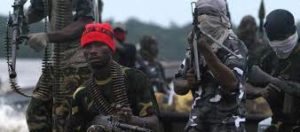 for oppressed peoples, for the poorest of the poor, the boot of the mighty that crushes the humble, the manipulation of the lives of human beings by commercial interests and the power that does not show its face, only by means of its hatchet bearers… Yet the human being and his rights, as Pope Francis so often repeats, is above all ideology.
for oppressed peoples, for the poorest of the poor, the boot of the mighty that crushes the humble, the manipulation of the lives of human beings by commercial interests and the power that does not show its face, only by means of its hatchet bearers… Yet the human being and his rights, as Pope Francis so often repeats, is above all ideology.
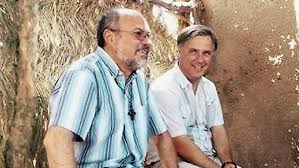 Your Italian Fraternity, your family, your diocese of Vicenza, your friends in Cameroon, are going to miss you, and all the brothers of the Priestly Fraternity shall have you as a benchmark of missionary commitment, courageous, a man of God, who leaves a mark to encourage us to continue working for the Kingdom and its justice. Giampaolo, your mission companion in Cameroon, will continue sowing the seed of this Kingdom that grows from the small and insignificant of our world.
Your Italian Fraternity, your family, your diocese of Vicenza, your friends in Cameroon, are going to miss you, and all the brothers of the Priestly Fraternity shall have you as a benchmark of missionary commitment, courageous, a man of God, who leaves a mark to encourage us to continue working for the Kingdom and its justice. Giampaolo, your mission companion in Cameroon, will continue sowing the seed of this Kingdom that grows from the small and insignificant of our world.
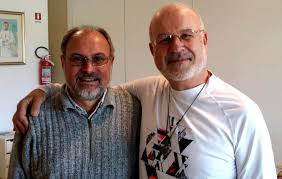 I had the great joy of meeting you personally in Castelfranco, Italy in 2015, and in Rudy, Poland, last Summer, sharing with you in the European Assembly of the Fraternity.
I had the great joy of meeting you personally in Castelfranco, Italy in 2015, and in Rudy, Poland, last Summer, sharing with you in the European Assembly of the Fraternity.
Something told me that you should take care of your health, and I said this to you. Over these past months we have been in touch and I have followed your case with concern. Today I thank the Lord for your life, for how you continued overcoming trials with that human quality of yours which teaches me to value the negative of life, knowing that if the grain of wheat does not die, it does not bear fruit. Like brother Charles, you have given everything for the most disadvantaged, and that fills me with joy, despite the pain of separation. From all that we consider painful, I am certain that something new, unexpected, positive and good for ourselves and for others emerges. Thanks for teaching me to have patience and peace.
Pray for us to God who today fills you with grace and love.
We will always remember you.
Aurelio SANZ BAEZA,
brother responsible, Priestly Fraternity Iesus Caritas,
Perín, Cartagena, Murcia, Spain, 28th August, 2018, The Martyrdom of St. John the Baptist
Biographical Note:
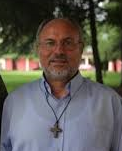 Gianantonio ALLEGRI, member of the Priestly Fraternity Iesus Caritas. Born 1957 in Pievebelcino (Vicenza, Italy). Ordained 1982. Curate in several parishes of Vicenza diocese. From 1991 to 2001 he worked as a Fidei Donum missionary in Cameroon. He returned to serve as Parish Priest of Magré di Schio until 2013. He returns to Cameroon and is kidnapped by Boko Haram for 57 days, with his companions, Sister Gilberte BOUSSIÈRE, from Quebec, and Giampaolo MARTA of the same diocese of Vicenza. Following his liberation, he returns to his diocese and serves as Parish Priest of Santa Maria Bertilla in Vicenza.
Gianantonio ALLEGRI, member of the Priestly Fraternity Iesus Caritas. Born 1957 in Pievebelcino (Vicenza, Italy). Ordained 1982. Curate in several parishes of Vicenza diocese. From 1991 to 2001 he worked as a Fidei Donum missionary in Cameroon. He returned to serve as Parish Priest of Magré di Schio until 2013. He returns to Cameroon and is kidnapped by Boko Haram for 57 days, with his companions, Sister Gilberte BOUSSIÈRE, from Quebec, and Giampaolo MARTA of the same diocese of Vicenza. Following his liberation, he returns to his diocese and serves as Parish Priest of Santa Maria Bertilla in Vicenza.
This morning he reached the arms of the Father after fighting cancer for a year.



